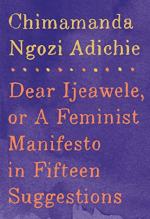
|
| Name: _________________________ | Period: ___________________ |
This test consists of 15 multiple choice questions and 5 short answer questions.
Multiple Choice Questions
1. As mentioned in Suggestion 12, what happened at the seminar Adichie and Ijeawele went to?
(a) The seminar threatened that girls should not ever speak with boys, because boys are bad news.
(b) The seminar suggested that girls wait until marriage to engage in relations with boys.
(c) The seminar threatened that talking to boys would end up with girls being pregnant or disgraced.
(d) The seminar told the girls that men would come after them at earlier ages.
2. As states in Suggestion 14, what is one topic of discourse related to gender that clashes with feminist thought?
(a) Discourse that says women are stronger parents than men.
(b) Discourse that centers around the female body and appearance.
(c) Discourse that does not recognize women at all.
(d) Discourse that assumes women are morally better than men.
3. What is one part of the Igbo culture that should be embraced as mentioned in Suggestion 9?
(a) Tradition.
(b) Dance.
(c) Money.
(d) Community.
4. What is one argument that Adichie makes about the difficulty for women to have to change their names after marriage?
(a) Women have to change passports, birth certificates, business licenses, and checking accounts.
(b) Women have to change their passports, signatures, social security numbers, and phone numbers.
(c) Women have to change passports, drivers' licenses, signatures, initials, and bank accounts.
(d) Women have to change credit cards, mortgage documents, and children's last names.
5. In Suggestion 7, what reason does Adichie give for keeping her maiden name?
(a) Adichie wants to shun the institution of taking the husband's last name.
(b) Adichie is unmarried.
(c) Adichie has both her maiden and her husband's last name.
(d) Adichie likes her name.
6. What type of beauty will Chizalum notice is valued, according to Adichie?
(a) Plastic surgery.
(b) Diverse beauty.
(c) Whiteness.
(d) Thinness.
7. What should Chizalum do if anything makes her uncomfortable, according to Suggestion 8?
(a) Speak her mother.
(b) Speak up, say it, and take action.
(c) Speak to the police.
(d) Speak up, say it, and shout it.
8. What is the main point of Suggestion 9?
(a) Give Chizalum the freedom to choose any profession.
(b) Allow Chizalum to do anything the things she wants.
(c) Give Chizalum a sense of identity.
(d) Allow Chizalum the responsibility of choosing her own friends.
9. When should Chizalum accept people walking different paths, as recommended by Suggestion 15?
(a) Chizalum should accept different paths if they encourage change.
(b) Chizalum should accept different paths if they do no harm to others.
(c) Chizalum should accept different paths if they are morally strong.
(d) Chizalum should accept different paths if they match her's.
10. At the end of the text, what is Adichie's last wish for Chizalum?
(a) Adichie's last wish is that Chizalum be a feminist.
(b) Adichie's last wish is that Chizalum will be kind, feminist, and humane.
(c) Adichie's last wish is that Chizalum will be healthy, smart, and a professional.
(d) Adichie's last wish is that Chizalum will be healthy, happy, and whatever she wants.
11. How does Adichie describe female misogyny in Suggestion 14?
(a) Feminists who want equality but do nothing to actual change perspectives.
(b) Women in the world who are against men, but also believe women are less superior.
(c) Feminist believers who still do not fully understand the principles of feminism.
(d) Women in the world who do not like other women just like men.
12. When female politicians change their last names to their husband's, what does this mean about society as touched upon in Suggestion 7?
(a) Voters prefer women with their own names
(b) Voters do not care and vote for whom they like.
(c) Voters place marital expectations on women.
(d) Voters vote more for a woman who has her husband's last name.
13. What do people who are unkind and dishonest still deserve according to the beginning of Suggestion 14?
(a) Kindness.
(b) Honesty.
(c) Dignity.
(d) Help.
14. What type of woman can undermine feminism with her deceiving words and entitlement, according to the end of Suggestion 14?
(a) "I am an anti-feminist" as if an women can make a statement and make feminism obsolete.
(b) "I am a feminist" as if a woman can say these words without any action.
(c) "I am a woman, but not a feminist" as if a woman who disregards feminism is automatically right.
(d) "I am not a feminist" as if anyone born with a vagina can dishonor feminism.
15. In Suggestion 10, when does it say girls stop being physically active?
(a) Girls stop when puberty arrives.
(b) Girls stop once boys start making fun of them.
(c) Girls stop when they discover make-up.
(d) Girls stop when they realize beauty is more important.
Short Answer Questions
1. At the start of Suggestion 7, what does Adichie mention about gender equality in relationships?
2. What should Ijeawele do about the onslaught of white beauty Chizalum will see?
3. Why does Adichie feel is a reason it is difficult for women to keep their names according to Suggestion 7?
4. What roles, according to Suggestion 7, do the world value in a woman more than anything else?
5. How does Adichie recommend Ijeawele appropriately respond to questions Chizalum poses about various types of people?
|
This section contains 987 words (approx. 4 pages at 300 words per page) |

|




